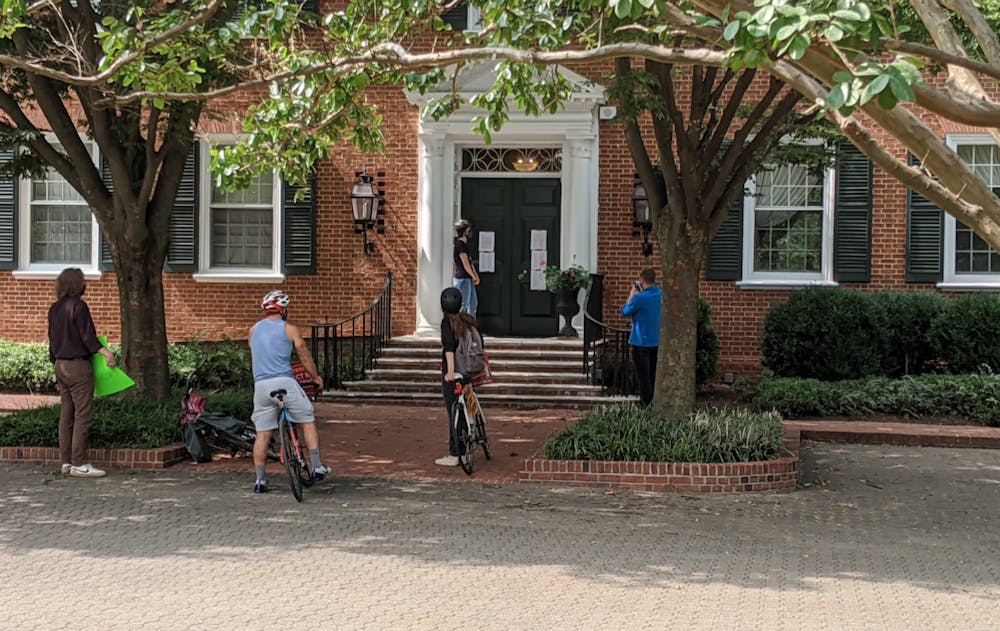The Coalition for a Humane Hopkins (CAHH), which aims to hold Hopkins accountable to the communities it has harmed, held a protest on Sept. 15 against the University’s practice of suing patients over alleged medical debt.
About 20 Hopkins affiliates and community members drove or biked through campus in protest. The caravan ended in Harriet Tubman Grove, where speakers criticized the University’s actions and praised community activism.
Mihir Chaudhary, a physician at a Hopkins field hospital, criticized the School of Medicine for not living up to its mission statement, which includes improving health in both the community and the world.
“We’re focusing for a second on one arm of Hopkins’ strategy of structural displacement and oppression: medical litigation,” Chaudhary said.
Hopkins Hospital has used hardball tactics to sue thousands of its Black and low-income neighbors in East Baltimore — for a median amount of $1,089 in alleged medical debt, according to a report published by CAHH, National Nurses United and the AFL-CIO in May 2019.
The report noted that Hopkins, along with other Maryland hospitals, was the subject of a Baltimore Sun investigation on medical debt lawsuits in 2008. After the investigation, Hopkins cut back on the number of lawsuits per year.
However, CAHH’s report illustrates that Hopkins filed over 2,400 lawsuits in the 10 years since.
Chaudhary noted that Hopkins has only sued in 17 cases over the last year.
“But even one litigation is one too many,” he said.
During the protest, five students taped a letter to University President Ronald J. Daniels’ front door calling on Hopkins to officially stop suing patients over medical debt. The letter also demands an end to wage garnishments, in which money is taken from people’s paychecks to pay off debt. Over 200 Hopkins affiliates signed the letter, along with 10 community groups.
In an interview with The News-Letter, graduate student Meg Chow expressed her hope that the letter, which she helped write, will prompt a response from the administration.
“We knocked on the door today,” she said in an interview with The News-Letter. “They didn’t answer and only responded by sending a bunch of security people out to check on us.”
Hopkins sues more patients living in the 21213 zip code, where nearly a third of residents are under the poverty line, than any other area.
In an interview with The News-Letter, Chaudhary stressed that the fear of future lawsuits prevents low-income patients from seeking medical treatment.
“Even life-threatening condition patients are sometimes hesitant and very nervous to get treated because of hospitals like Hopkins’ medical lawsuit practices,” he said.
Kim Hoppe, vice president of communications at the School of Medicine, stated in an email to The News-Letter that Hopkins provided $1.4 billion in aid and offers financial assistance programs.
“In April 2020, Johns Hopkins stopped authorizing new legal action related to patients with unpaid medical debt, even though hospitals in Maryland are required to comply with the state’s rate-setting commission which mandates that health care systems pursue payment from people who have not paid for their care and do not demonstrate financial need,” she wrote.
However, CAHH feels that this is not enough until Hopkins commits in writing to halt its practices once and for all.
Father Ty Hullinger, pastor of three East Baltimore churches, explained at the event that even though Hopkins responds to community pressure, it resumes its practices later.
“They’ll lie in wait, they’ll let go, they’ll stop the suing now, knowing they can start it up again,” he said. “The one thing that can prevent that is to get them — committed — to put it into writing.”
Chow, who completed her undergraduate degree at the University, emphasized that her view of the University changed once she began working at Hopkins Hospital.
“I realized a lot of the talk is mostly facade,” she said. “Behind the scenes, there’s a lot of exploitation of community members around Hopkins and the patients that they serve, as well as the students and workers of the Hospital itself.”
Chaudhary argued that medical debt lawsuits are only one way that Hopkins mistreats low-income communities of color, noting that the University’s private police force was going to be centered in East Baltimore.
“It’s very easy to see how there’s a geographical and structural plan to change the nature of those communities, to remove those working-class Black families and to remove them from their homes and change both the racial and class composition of the communities around Hopkins,” he said.
Last month, the Coalition Against Policing by Hopkins, consisting of about a dozen student and community groups, marched against the implementation of the Johns Hopkins Police Department (JHPD). Speakers underscored how the JHPD would add to the University’s history of gentrifying the area, citing the East Baltimore Development Initiative, which displaced over 700 families near the medical campus.
Donald Gresham, president of the Baltimore Redevelopment Action Coalition for Empowerment, thanked everyone present for their commitment against medical debt lawsuits.
“I appreciate you all standing up for right and shaming the wrong,” he said. “I’m excited by you all. Only you can be the difference.”
Correction: The article originally stated that a majority of patients sued by Hopkins reside in the 21213 zip code area. While a plurality of residents sued are from this area, the total is under 50 percent.
The News-Letter regrets this error.





